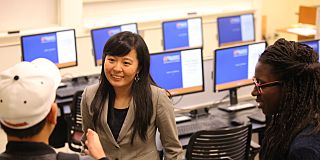M.S. in Global Commerce
Curriculum
The M.S. in Global Commerce is a 30-credit-hour program designed for students who aspire to careers of global impact. Students experience a transformative journey as they live and learn with a diverse cohort and complete a three-part curriculum that includes a Global Business Core, skill-building experiences, and a Social Impact Project.
GCOM 7648: Global Challenges: Commerce in Context (4 credits)
The Global Challenges seminar explores the idea that all commerce takes place within a highly interconnected and constantly evolving global context, or system, and that this system is facing urgent and unsustainable global challenges. From climate change and growing inequality to AI and an evolving world order, these challenges arise from the confluence of social, economic, ecological, technological, political, and geopolitical stresses. The seminar begins with a close examination of our globalized system of commerce. We then consider the systemic stresses. The seminar concludes by contemplating how changes within the system itself could make a positive difference. Drawing from multiple disciplines including economics, environmental science, sociology, commerce, and foreign affairs, students will build analytical skills for understanding complex global systems and evaluating potential solutions. By the end of this course, students should have a deepened understanding of the world we live in, appreciate the global challenges we face, and feel better equipped to positively impact society and our planet through their chosen careers and leadership roles.
GCOM 7649: Global Strategy & Management (1.5 credits)
This course provides an introduction to the key strategic and managerial challenges of operating in a global business environment. Students will explore how firms assess international opportunities, select market entry strategies, and build competitive advantage across different regions. The course also examines the organizational and leadership complexities of managing people and operations across cultures, highlighting the role of cultural intelligence, multinational structures, and global leadership skills. In the final sessions, students will engage with ethical dilemmas and sustainability challenges that arise in international business, considering how firms navigate issues such as labor practices, corruption, and corporate social responsibility. Through case discussions, interactive exercises, and self-assessments, students will develop a foundational understanding of global strategy and management while reflecting on their own leadership capabilities.
GCOM 7650: International Corporate Governance (1.5 credits)
Corporate governance concerns the relationship between managers and a firm’s other stakeholder groups including shareholders, employees, and the larger community. Studying governance offers students insight into the strategic decision-making of top executives and how those decisions are shaped by monitoring, incentives, and stakeholder pressures. This seminar will introduce fundamental theories of corporate governance and explore how governance practices differ across countries. Key areas of focus will include the composition and structure of corporate boards, executive compensation practices, the market for corporate control, and the role of external monitors. Students will consider how institutional context influences these governance practices and what implications they have for firm performance and strategy. Students will also discuss how globalization is driving changes in governance and examine different perspectives on what practices are “best” for international organizations.
GCOM 7652: Technology, Analytics and Decision-Making in Global Organizations (3 credits)
This course examines the critical role information systems play in modern global organizations. Through case discussions and hands-on practice using tools and commonly applied frameworks, students will gain a foundational understanding of how information systems, machine learning, and AI fit within broader organizational systems, including their application to data analytics for decision-making. The course will help students gain skills to successfully use technology to generate organizational value in a global context.
GCOM 7653: Doing Business in the USA (non-credit)
This course examines the structure and customs of the conduct of business in the United States. The class culminates in a trip to Washington, DC, to visit businesses and major organizations.
GCOM 7655: Global Marketing in the Digital Age (1.5 credits)
It has become more important than ever for firms to recognize that they compete in a global environment. This global environment is constantly changing. Consequently, managers must seek to develop the empathy, knowledge, sensitivity, and skills required to successfully operate in a dynamic, and, often, digital global marketplace. This course explores the concept of global marketing and the institutions, managerial processes, models and/or frameworks, strategies, tactics, and theories related to marketing in the global (and, increasingly, digital) arena. The impacts of international economics, culture, and nationalistic governmental policies on marketing decision-making in global firms are considered. Topics include global product decisions, digital branding, pricing and distribution decisions for different markets, cross-border e-commerce, and global consumer behavior in the digital space.
GCOM 7656: Global Financial Management (1.5 credits)
This course provides an exploration of international financial systems, institutions, and investment dynamics, introducing students to the primary financial concepts and techniques used by international business managers. The course is organized in three modules: (1) Participants, Politics, and Process in Global Markets, examining key institutions, trade and capital flows, monetary policy, and financial crises; (2) Foreign Exchange Markets, focusing on exchange rate determination, currency regimes, and risk management strategies; and (3) Global Financing and Investing, delving into international debt and equity financing, private capital markets, and foreign direct investment approaches and risks. Through case studies, theoretical models, and real-world applications, students will develop a deep understanding of how global markets function and impact business and economic decision-making.
GCOM 7657: International Consulting (1.5 credits)
This course is designed to provide students with a broad overview of management consulting and other related advisory services professions in international contexts while also helping students develop skills that are broadly applicable in these professions as well as in other fields (business, politics, not-for-profit, etc.). Students will gain an appreciation of industry structure and competitive dynamics, major practice areas, and future trends that help to make management consulting and advisory services unique from other areas of business. Working both individually and in teams, students will gain experience in the practice of consulting through key skills, including problem identification, problem structuring, data collection, problem-solving, client presentations, and client management. Particular emphasis will be placed on the additional opportunities and challenges that arise in international contexts. The learning process will consist of lectures, cases, readings, exercises, guest speakers and applied projects. This wide variety of learning methods is intended to convey both the necessary knowledge and practical skills necessary for building a sound foundation for becoming an effective international consultant.
*Designed to help prepare students to complete the Social Impact Project.
GCOM 7658: Project Management (1.5 credits)
Project work is an important way for businesses to implement new ideas in the pursuit of continuous improvement. Despite the pervasiveness of project work, studies estimate that more than half of all projects fail to deliver their intended value, experience cost overruns, and/or are delivered late. These challenges are often exasperated when projects span geographies and cultures. In this course, students will learn the principles of project management, situated within a global context. Topics include initiating/planning/estimating, risk management, requirements gathering, and project/performance monitoring in both a traditional (waterfall) approach to project management, as well as agile and hybrid project management methodologies. With specific attention to challenges that emerge when organizing and managing projects that span multiple geographies and cultures, students will gain skills that can help reduce the risk of cost/time overruns and increase the likelihood of delivering project output that drives real value to organizations.
*Designed to help prepare students to complete the Social Impact Project.
Negotiation (3.25 credits)
Whether we appreciate it or not, we are all negotiators. Sometimes, the occasion is obvious; we know we are entering into a negotiation that will have large ramifications for our future. When negotiating a salary, contract, or other deal, the outcomes of the negotiation will clearly determine important things for us. But other less obvious negotiations pepper our days. Whether it's negotiating over a workload with a colleague, our needs with a service provider, or our joint life with a significant other, these negotiations dictate the shape our lives will take.
Despite negotiation being such a pervasive, high-stakes activity, we tend to know little about the strategy and psychology that make for successful negotiations. Why are we sometimes successful in coming to a rewarding agreement, yet at other times, we are left with the feeling that we have lost?
In this course, students will learn about the art and science of negotiation, as well as will work on understanding the interdependent nature of agreements and the skills and tools that can be used to conduct negotiations that achieve the best outcomes. To enable students to become better negotiators, they will also learn about the theory behind negotiation and develop their understanding of important processes in different contexts.
By developing a foundational understanding of negotiation through theory and practice, students will become better-equipped negotiators, no matter what the occasion.
Social Entrepreneurship (2 credits)
Entrepreneurs are problem-solvers. In the 21st century, the world faces severe social and environmental challenges that we urgently need to address to ensure long-term peace and prosperity. Social entrepreneurship is a unique opportunity to build businesses that matter by combining purpose and profit to address development challenges.
The course is designed for students who are passionate about using their business skills to address complex challenges. Students will work on developing concrete social business ideas based on the Sustainable Development Goals (SDGs), focusing on various aspects of launching a social business idea such as financial forecasting, impact measurement, and fundraising strategies. Through real-life case studies and direct interactions with social entrepreneurs from Europe and East Africa, students will gather valuable insights into best practices and experiences on how to set up successful social enterprises. Ultimately, the course will empower students to make a positive difference in the world by equipping them with the necessary tools to pitch and pursue their social business idea.
Operations and Global Supply Chain Management (2 credits)
Operations management concerns the activities that organizations do to produce goods and services for their customers. In essence, these activities are business processes that take source inputs (e.g., raw materials), utilize resources (e.g., labor, capital) to add value and process them into final products or services, and, finally, deliver these to match customer demand. In this course, students will study core strategies and tools to analyze and improve these business processes. They will also introduce theories and discuss strategies to integrate the processes within the organization and to coordinate them across the value (supply) chain.
Entrepreneurial Finance and FinTech (2 credits)
This course provides a broad view of entrepreneurial finance. It aims to facilitate an understanding of how entrepreneurs raise financing from investors, how investors select startups, and how financing contributes to a startup’s success.
Open and Distributed Models of Innovation (2 credits)
Organizations increasingly recognize that breakthrough innovations often originate beyond their own walls. Companies that harness distributed knowledge from customers, communities, partners, and even competitors stand to gain a competitive edge. This course offers frameworks and practical tools for managing such open and distributed innovation processes, with an emphasis on understanding how to integrate external inputs—especially user-driven innovations, community-based contributions, and AI-enabled insights—into core strategy and operations.
Building on classic and contemporary perspectives, students will dissect why some firms succeed by reaching beyond their boundaries, while others fail. They will investigate how different models—ranging from open-source ecosystems to innovation contests—can be employed to accelerate product development, reduce R&D costs, and expand market reach. Throughout, theoretical concepts will be linked to actionable practices via real-world cases, focused discussions, and lectures. By the end of the course, participants should be able to identify when and how to adopt open innovation practices, recognize the tradeoffs between fully and selectively open models, and assess the strategic impact of external collaborations on a firm’s innovation portfolio. In addition, students will examine the emerging role of AI, not only in supporting open innovation search processes (e.g., automated partner or idea scouting) but also in shaping entirely new innovation ecosystems.
Agile Leadership (2 credits)
This course is designed to equip students with the knowledge and skills needed to excel in a dynamic environment, where adaptability, innovation, and responsiveness are essential. Participants will delve into the principles of agile leadership, including agile methodologies, ambidextrous organizations, and the development of a leadership approach that encourages organizational resilience and growth.
Social Impact Project (Capstone) (4 credits)
The Social Impact Project offers students the opportunity to serve as an economic or management consultant for a social impact organization, such as a nonprofit organization, a CSR department, a development agency, a social enterprise, or a social impact project of a for-profit organization. Working on this consulting project serves a number of ends in students' degrees. It develops skills in initiative-taking, problem-solving, and project management that are difficult to acquire without guided practice. Furthermore, concrete knowledge and experience around social impact and operating in intercultural contexts is highly important for students' future careers. Emerging regulations and standards incentivize public and private sector organizations to align their activities with sustainable development goals, the Paris Agreement, and biodiversity frameworks, creating a growing market for talents with knowledge of social impact and sustainability. Unique to ESMT, students are required to use these skills to benefit society as a whole, which is a cornerstone of ESMT’s mission. The Social Impact Project is therefore applied fieldwork with the goal of developing well-rounded, socially conscious graduates.
Students will also participate in two afternoon workshops, for which they will be awarded ¾ of a credit.


